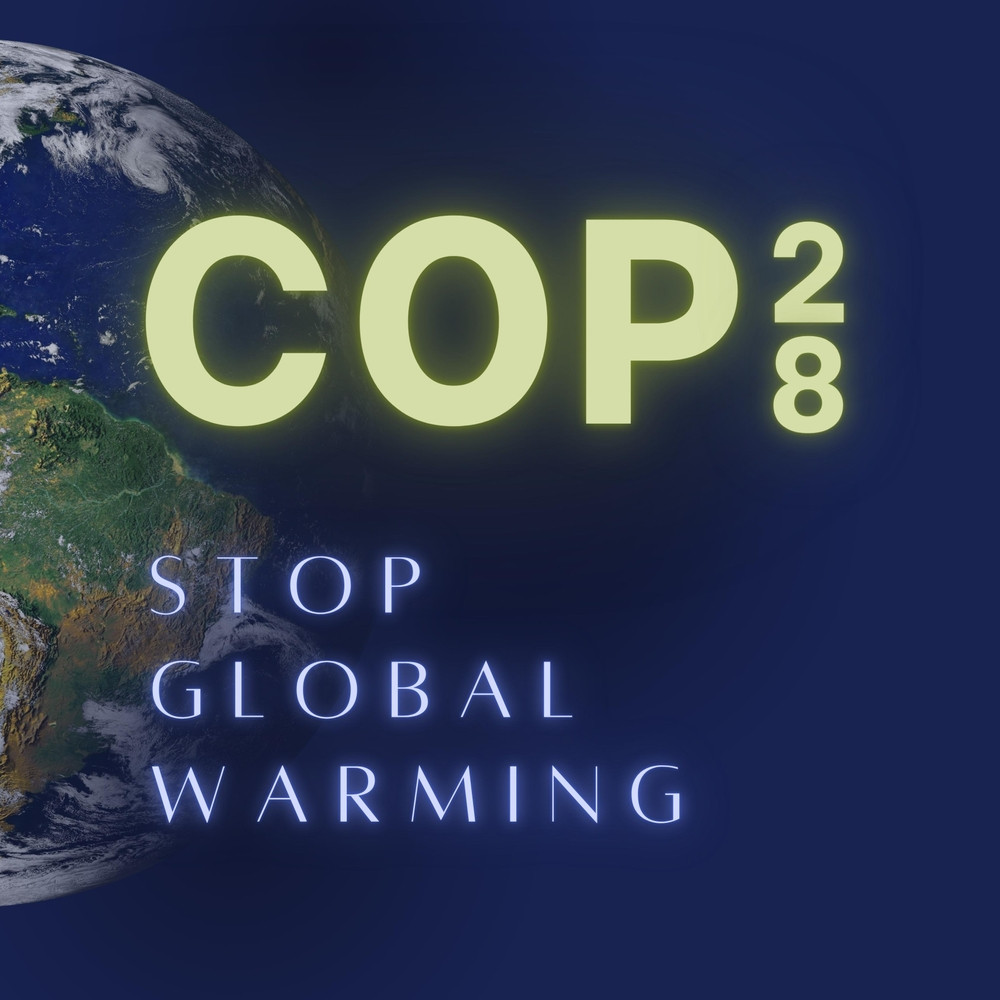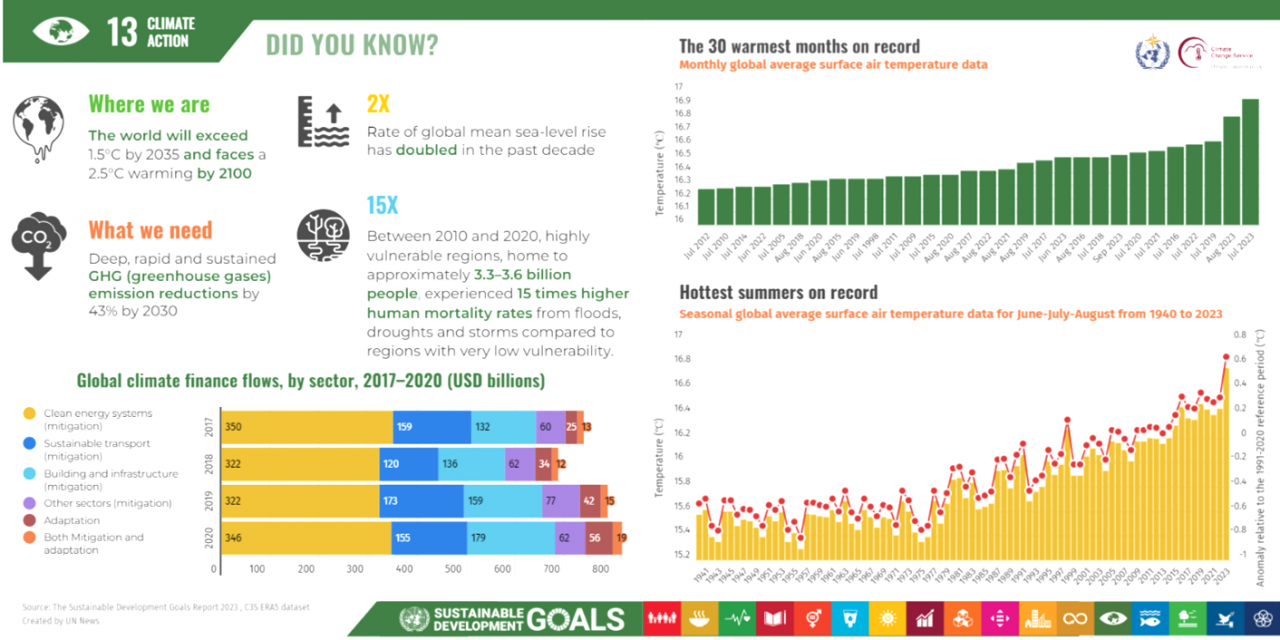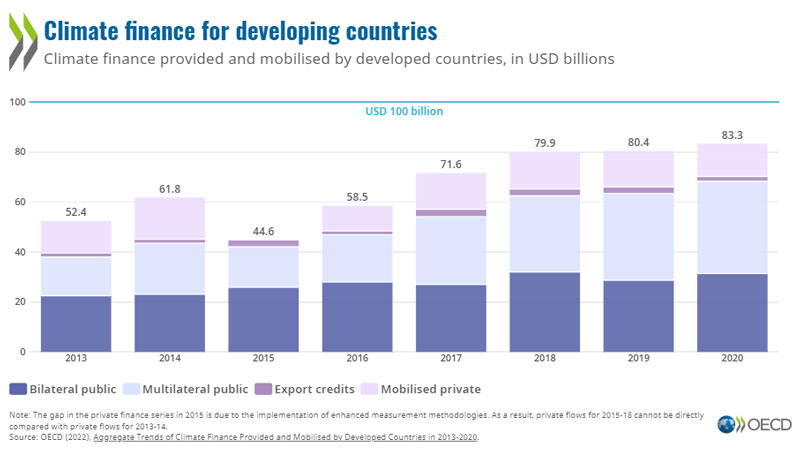With less than a month to go for the 28th session of the Conference of Parties (COP28) to the United Nations Framework for Climate Change (UNFCC), global voices calling for accelerated phase-out of fossil fuels and an increase in climate adaptation finance have started to grow louder.
The preliminary findings of the first Global Stocktake of the Paris Agreement published in September 2023, warn that the world is not on track to reach the long-term goal of the Paris Agreement and action is required on all fronts to limit global temperature rise within 1.5 degrees Celsius. Another report published in October 2023, the Adaptation Gap Report, also sounds alarm noting inadequate investment and planning on climate adaptation has left the world exposed.
While this year's COP28 is bound to put multilateralism to the test, what remains to be seen is will the countries around the world unite and come through with a common strategy to keep 1.5 degrees Celcius within reach. Or will the economic interest triumph over environmental ones?
The COP28 climate dialogue is expected to witness strong views on several themes between the leaders of the developed countries, the developing countries, and those that remain most vulnerable to intensifying climate disasters. Here, we examine the key talking points that are likely to dominate the COP28 climate dialogue.
Language on fossil fuel
COP28 will be looked upon to provide a robust response to the key findings of Global Stocktake, and a key to that dialogue will be the language on the use of fossil fuels.
On one side, the European Union has decided to push for the phasing out of unabated fossil fuels at COP28. The US climate envoy John Kerry has also pushed for the end of new unabated coal-fired power plants. And recently, 131 companies, collectively worth nearly $1 trillion in global annual revenues urged the COP28 attendees to phase out fossil fuels. "We call on all Parties attending COP28 in Dubai to seek outcomes that will lay the groundwork to transform the global energy system towards a full phase-out of unabated**** fossil fuels and halve emissions this decade," the companies stated in their open letter.
On the other side, China, the top emitter of greenhouse gases in the world, has been reluctant to commit to any commitment on fossil fuel phase-out. Based on round-table discussions of diplomats held in September, China's top climate envoy, Xie Zhenhua, noted that the phase-out of fossil fuels was "unrealistic", but China would be open to setting a global renewable energy target during the talks.
India, another top emitter of planet-warming GHGs has also resisted calls to commit to a deadline for the phase-out of fossil fuels. In turn, it has urged the developed countries to become net negative emitters before 2050 to enable the world to achieve the target of global net zero while also allowing developing nations to use the available natural resources for growth.
Speaking about fossil fuels at the Pre-COP meeting, President, Dr. Al Jaber said, "I know there are strong views about the idea of including language on fossil fuels and renewables in the negotiated text. I need you to work together to come forward with solutions that can achieve alignment, common ground, and consensus between all parties." Speaking of slashing emissions from fossil fuels and fast-tracking energy transition, the COP28 chief has also urged parties to triple global renewable energy capacity to at least 11,000 GW while doubling annual average energy efficiency by 2030.
It is important to note, that earlier this year UAE had batted in favor of fossil fuels rather than phasing down fossil fuels, however in the months leading to COP28, the UAE Presidency has made clear that phasing down demand for, and supply of all fossil fuels is inevitable and essential.
Climate Finance
Climate finance is critical for enabling climate action. Acknowledging this, at the COP15 held in Copenhagen in 2009, the developed countries committed to a collective goal of mobilizing $100 billion annually per year by 2020 to the developing countries for meaningful mitigation actions and transparency on implementation. However, the goal has been extended through 2025.
While there has been disbursement of some funds, the developed countries largely have fallen short of the trillions of dollars needed to achieve this financial commitment. Brazil, China, and India among other countries have stridently advocated for developed nations to follow through on their climate finance pledges.
According to the estimates provided by an independent group of economists, if countries are to achieve the goals of the Paris Agreement, emerging and developing countries need more than $ 2.4 trillion of annual investment in climate action by 2030.
The COP28 Presidency is expected to encourage developed countries to progress and provide assurances on the delivery of the $100 billion, in conjunction with Germany and Canada as coordinators of the Climate Finance Delivery Plan. Additionally, we may witness substantial replenishment of the Green Climate Fund (GCF), with a balance between mitigation and adaptation finance.
According to the OECD analysis (2013 -2020), the majority of climate finance provided by developed countries is largely focused on climate change mitigation efforts rather than climate adaptation. Further, loans continued to be the main instrument used to provide public climate finance. Grants represented a larger share of climate finance for Small Island Developing States (SIDS), Least Developed Countries (LDC), and fragile states, compared to developing countries overall. And, the mobilization of private climate finance was lower than anticipated, with most mobilized in middle-income countries characterized by enabling environments and low-risk profiles.
COP28 is likely to bring clarity on some of the above aspects of climate finance.
Further, the role of international financial institutions (IFI) and reforms therein is also expected to take center stage at the summit. In a recent statement issued by the heads of the Multilateral Development Bank (MDB), the group agreed to strengthen collaboration to boost joint action on climate and align financial goals in line with the Paris Agreement on climate change. Speaking of MDB reforms COP28 Chair, Dr. Sultan bin Ahmed Al Jaber has expressed the climate summit will address these reforms to "unleash more concessional dollars, lower risk, and attract more private finance for vulnerable communities."
In addition to delivering on existing commitments, the UAE Presidency is working to put in place a framework for a new deal on climate finance.
Climate-related Health RisksThe impact of climate change on health carries significant economic ramifications. While health has not been a specific focus at COP until this year, the UAE Presidency may likely set a precedent for it to be part of all future conferences.
According to the World Health Organization (WHO), between 2030 and 2050, climate change is expected to cause approximately 250,000 additional deaths per year from malnutrition, malaria, diarrhea, and heat stress. By 2030, the direct health costs caused by climate change are estimated to be between US$2 billion and $4 billion a year.At this year's COP, the WHO and several countries will host the first-ever Health Day (December 3) and climate-health ministerial. The conference is expected to see commitments towards climate-resilient and sustainable low-carbon health systems. Dialogue on increased concessional funds allocated to the Global South to lower risks, priority investment areas, and policy actions to address the climate burden on health systems will be some key talking points.
The Health Programme at COP28 will be centered on the following key topics: Health impacts of climate change, health benefits of climate mitigation, climate resilient low-carbon health systems, health adaptation, and action for health, relief, recovery & peace.
When is COP28?
The 28th session of the Conference of Parties (COP28) to the UNFCC will be held from Nov. 30 - Dec. 12, at the Expo City in Dubai, UAE. The four pillars of the COP28 Presidency Action Agenda are: Fast-tracking the energy transition and slashing emissions before 2023, transforming climate finance by delivering on old promises and setting the framework for a new deal on finance, putting nature, people, lives, and livelihoods at the heart of climate action and mobilizing for the most inclusive COP ever.

COP-28 President calls for tripling global renewable power capacity by 2030 -
Read More



